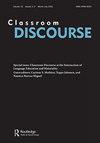The dialectical unfolding of paradigmatic and narrative thinking in a Chinese-as-a-foreign-language classroom
IF 1.6
Q2 EDUCATION & EDUCATIONAL RESEARCH
引用次数: 2
Abstract
ABSTRACT How do language instructors fulfill institutional mandates while also nurturing students’ interest? What becomes of this process when it unfolds not in one class meeting but in a series of pedagogical events? Classroom research has suggested the importance of integrating authentic, conversational, and rapport-building talk with instructional practices. What remains unknown but central to classroom practices is the temporal, institutional, and psychological underpinnings this integration entails. This ethnographic study explores the dialectical unfolding of paradigmatic and narrative thinking in a course of domestic U.S. students and international Korean students. Paradigmatic thought is concerned with truth, scientific logic and categorization, which are essential for explaining language features. Narrative thought ‘strives to put its timeless miracles into the particulars of experience, and to locate that experience in time and place.’ Drawing on classroom recordings, participant interviews, and instructional artifacts, the study shows that ordinary materials designated by the institution to underscore paradigmatic thinking were rendered extraordinary when the instructor and students collaboratively transformed them with interpersonally and interculturally meaningful stories across a chain of pedagogical encounters.范式思维与叙事思维在对外汉语课堂中的辩证展开
语言教师如何在满足机构要求的同时培养学生的兴趣?当这个过程不是在一次课堂上展开,而是在一系列的教学活动中展开时,它会变成什么呢?课堂研究表明,将真实的、对话式的、建立融洽关系的谈话与教学实践相结合是很重要的。课堂实践的核心是这种整合所需要的时间、制度和心理基础,这是未知的。本民族志研究在美国国内学生和韩国留学生的课程中探讨了范式思维和叙事思维的辩证展开。范式思维关注的是真理、科学逻辑和分类,这是解释语言特征所必需的。叙事思想力求将其永恒的奇迹融入经验的细节中,并将经验定位于时间和地点。根据课堂录音、参与者访谈和教学文物,该研究表明,当教师和学生在一系列教学遭遇中通过人际关系和跨文化意义的故事合作转化时,学校指定的强调范式思维的普通材料变得非凡。
本文章由计算机程序翻译,如有差异,请以英文原文为准。
求助全文
约1分钟内获得全文
求助全文

 求助内容:
求助内容: 应助结果提醒方式:
应助结果提醒方式:


